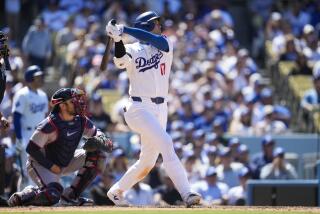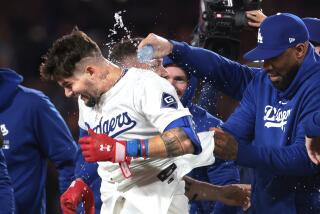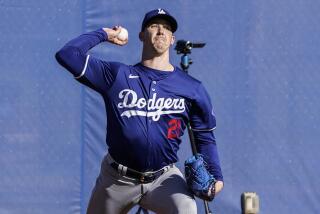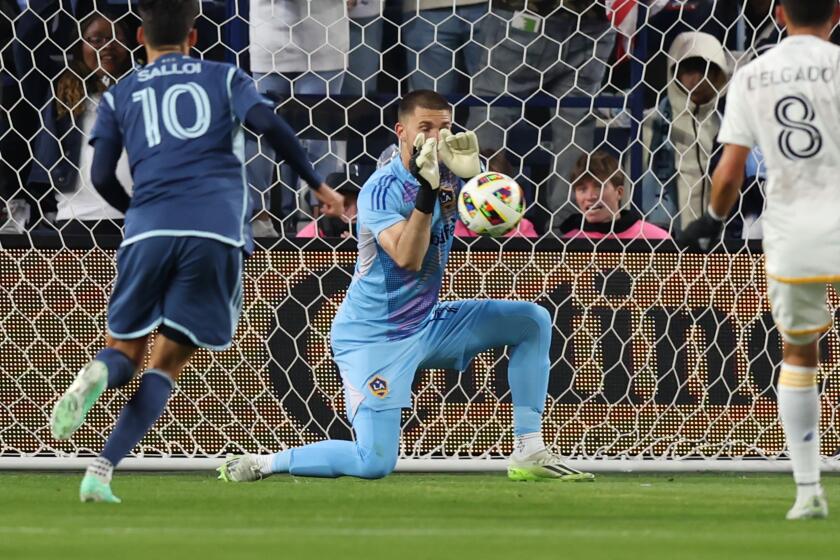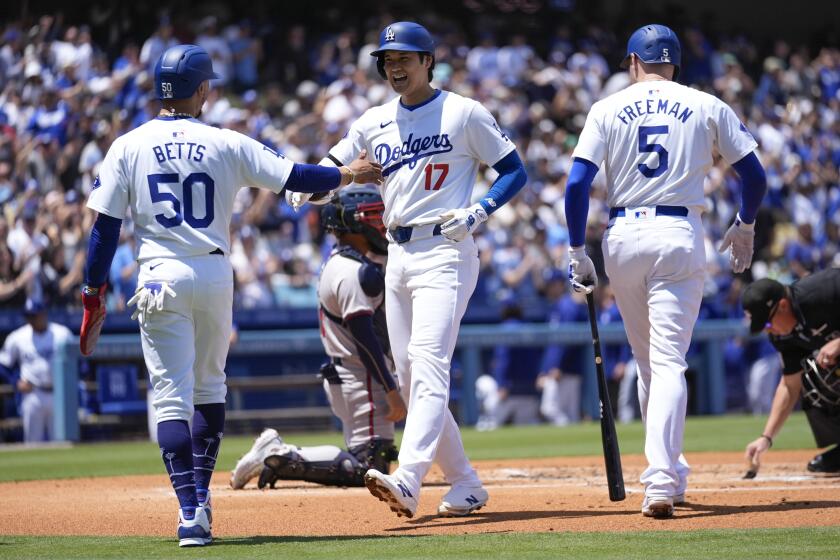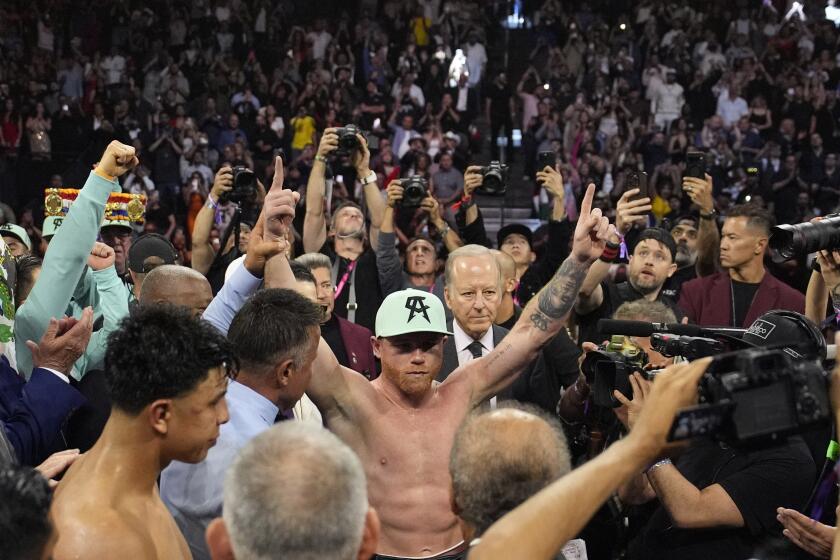League Has Popularity, but Needs Personality
The guys who taught sports how to market are back.
The Phoenix Suns and New Jersey Nets, struggling artistically and/or commercially, just sold for $401 million and $300 million, respectively. In comparison, the once-storied Dodgers, who still draw 3 million fans annually, went for $430 million, complete with Dodger Stadium and training sites in Vero Beach, Fla., and the Dominican Republic.
Most NBA teams are profitable, even if more than $100 million of the profits will be money redistributed from the monster luxury tax bills paid by the New York Knicks ($42 million), Portland Trail Blazers ($34 million) and Dallas Mavericks ($27 million).
None of the three made it as far as the second round of the playoffs, but you have to admire their spirit. On behalf of their partners, keep it up, boys.
In a stunner, the NBA is projecting $3.3 billion in merchandise sales, topping everyone, including the mighty NFL for the first time.
Let’s put it this way: When it comes to marketing, you wouldn’t want to underestimate anyone who can expand to the same city twice.
Of course, with all this prosperity, there’s still one little problem: Getting anyone to watch the product.
When TV ratings for the NBA Finals cratered to 7.5 last spring, Commissioner David Stern said it was “market-specific,” meaning they’d caught an unlucky draw with San Antonio, a small market, and New Jersey, a lame one.
The real problem for Stern is that he has 28 problem markets with 28 problem teams, and the Lakers. That’s where his “joke” about his ideal Finals being “the Lakers against the Lakers” came from.
Uninspired first-round ratings popped to life for the second round, highlighted, of course, by the Lakers-Spurs series, which is blotting out the others, as usual.
Even in Eastern cities, this series is preeminent, as suggested by headlines in the Boston Globe (“Spurs-Lakers: Winner Take All”) and Chicago Tribune (“Rematch May Play Like Finals.”) A Minneapolis Star-Tribune headline called the Timberwolves-Kings series “That ‘Other’ Semifinal.”
The good news for the league is, the basketball should be good the rest of the way, with lots of teams appearing evenly matched.
The bad news is, the Lakers might not be one of them. It has been a while, but near as I can remember, we’re two games into the Lakers-Spurs and the local team isn’t doing that well.
Yet to be determined is the drawing power of Indiana-Minnesota or Detroit-San Antonio. They’re all grinding defensive teams, so unless the Kings get in, no one will be tuning in to see spectacular offense.
Not that everything is slowing down, but the over/under for Game 2 of Detroit-New Jersey was 164 points. Ten years ago, when Pat Riley’s Knicks played Houston in the Finals, they still combined to average 173.
It’s not hard to see why the Lakers are so popular, or hated. They’re a marquee team in a mega-market with big, splashy personalities such as Shaquille O’Neal, Kobe Bryant, Karl Malone, and, assuming he’s still here, Gary Payton.
All the other big-market glamour teams -- the Knicks, Boston Celtics, Chicago Bulls, Philadelphia 76ers -- are gone, and none is likely to be going deep into the playoffs soon.
Nor are there many players anyone cares about. The NBA once produced such personalities as Michael Jordan, Magic Johnson, Larry Bird and Charles Barkley. Now, it just produces millionaires.
The Spurs’ Tim Duncan is a nice guy with a good sense of humor, but his pulse rate seems to drop to alarming levels when talking to the press.
The Toronto Raptors’ Vince Carter spent so much time denying he was a star, and playing like it, pretty soon he wasn’t.
The Timberwolves’ Kevin Garnett is livelier but closed off, taking so long to make himself available after games and speaking so infrequently on days off, two beat writers e-mailed peers, asking them not to put him on the All-Interview Team.
The All-Interview Team was another NBA first, a tacit boast of how great its players were to cover. Now it’s an anachronism, because it’s like running around after movie stars.
Interview sessions are brief and monitored closely by public relations people, who may end them in mid-question. Supposedly facilitating access, their job is really to follow the coach’s orders, and he wants this over so he can get back to the hotel and obsess over four more hours of videotape before the game.
Nor has prosperity enhanced the ambience. The press corps has grown dramatically, with cable TV and radio outlets doubling or tripling the size of the pack and 24/7 coverage blowing everything out of proportion.
Before Johnson retired in 1991, he sat in front of his cubicle before games, talking for hours. (In those days, the media were allowed in early and could stay until 6:45 p.m. for a 7:30 game; now it’s just 6 to 6:45.)
When Johnson returned in 1996, there was a horde waiting for him, rather than one or two guys. He began holing up in the trainer’s room and coming out for the last five minutes the media were allowed in the dressing room.
Now, stars don’t come out of the trainer’s room until the media are gone.
Besides the Lakers, there are a lot of stars but only a few personalities.
Sacramento’s Chris Webber, perhaps the most reviled star of his era, is one of the most accessible and colorful, although this was a subdued season for him.
The 76ers’ Allen Iverson is rarely accessible but so colorful, he couldn’t stop being a personality if he went to practice on time.
The Orlando Magic’s Tracy McGrady is candid enough to rip his teammates for quitting, before quitting himself. Well, nobody said their stuff had to make sense.
The Houston Rockets’ Steve Francis might be into that modern, here-look-at-my-big-heart stuff, but he’s a stand-up guy.
The rookies were promising. Cleveland’s LeBron James not only has an old-school game but isn’t frightened by the obligations that come with his fame. Denver’s Carmelo Anthony says what’s on his mind, like, “I’m not going back into this game,” or, “I got disrespected in the rookie voting.”
The Nets’ Kenyon Martin has some sizzle. So does teammate Richard Jefferson, a real talker and a comer as a player.
The Knicks’ Tim Thomas was lost in Milwaukee but showed promise in New York when he called Martin “fugazy,” a slang term for fake. Of course, it’s better if you’re a good player, and if you play another game in the series after you insult someone.
Not that any of them can rank with O’Neal, who’s not always in the mood, either, but is also funny and playful enough to think up stuff in advance. Oh, you thought he came up with the Big Pythagorean Theory on the spot?
Nevertheless, because none of them are Barkley, that’s a little thin to carry an entire league.
Stern once actually attributed TNT’s ratings, which run higher than ESPN’s, to Barkley’s high jinks on the studio show, which would make him a rare property, indeed.
For all the hype around TV commentators, it’s axiomatic that none of them mean a tenth of a ratings point, which must be how ABC got away with putting Dennis Miller on “Monday Night Football.”
Because the over-the-air network’s Finals rating is perceived as your league’s grade, it might be a good idea for ABC, which must replace Doc Rivers, to bring over Barkley, no matter what it has to pay.
In the days of the endangered Laker and the 164-point over/under, it just might be a lunatic they’re looking for.
More to Read
Get our high school sports newsletter
Prep Rally is devoted to the SoCal high school sports experience, bringing you scores, stories and a behind-the-scenes look at what makes prep sports so popular.
You may occasionally receive promotional content from the Los Angeles Times.
